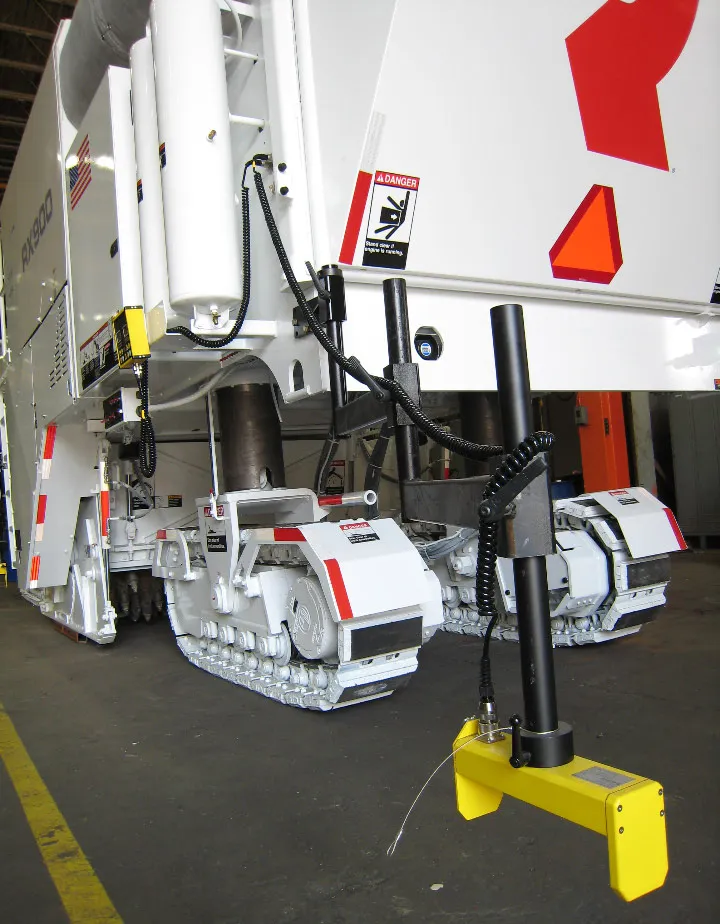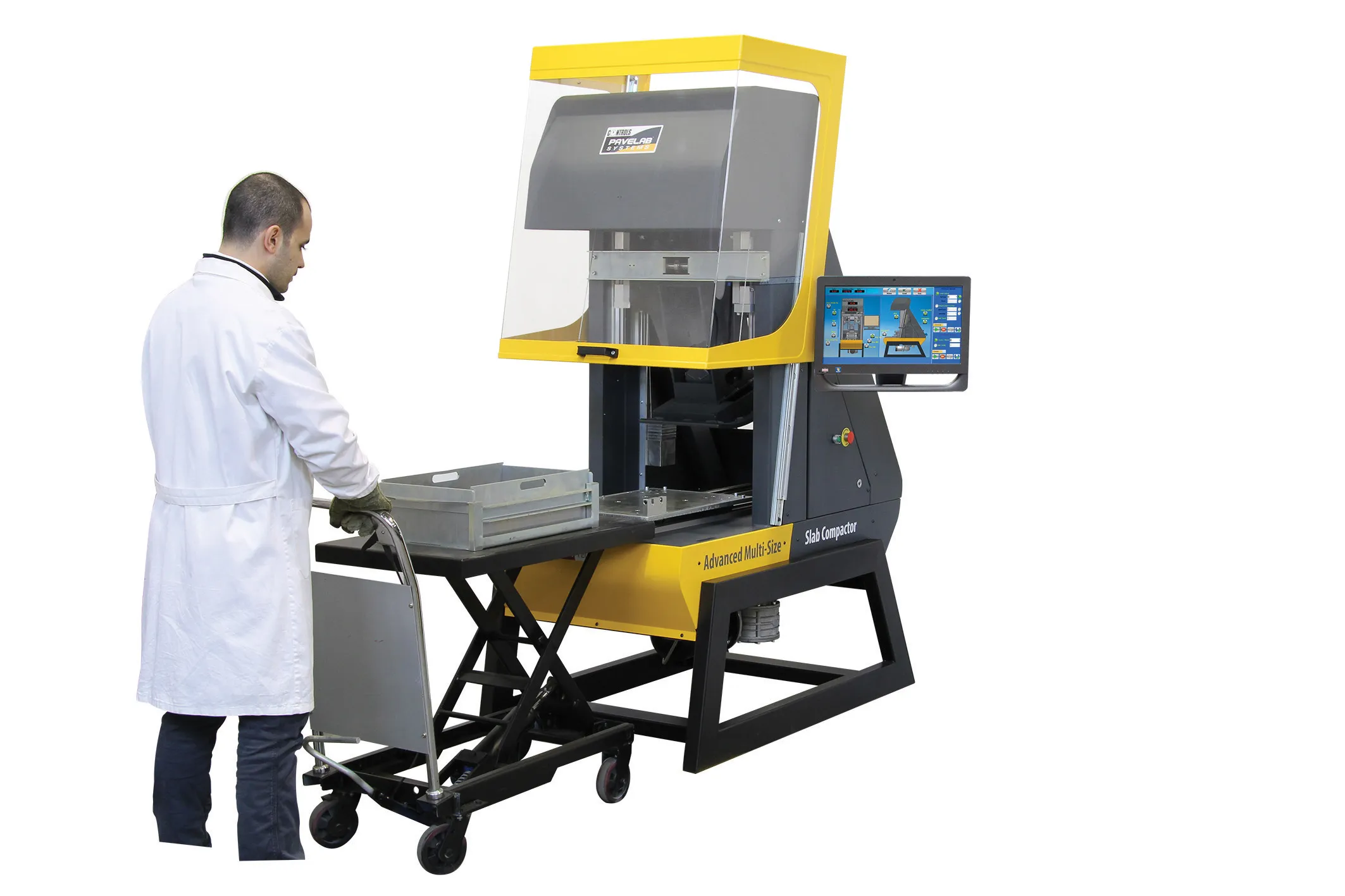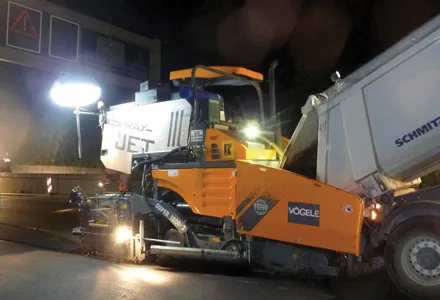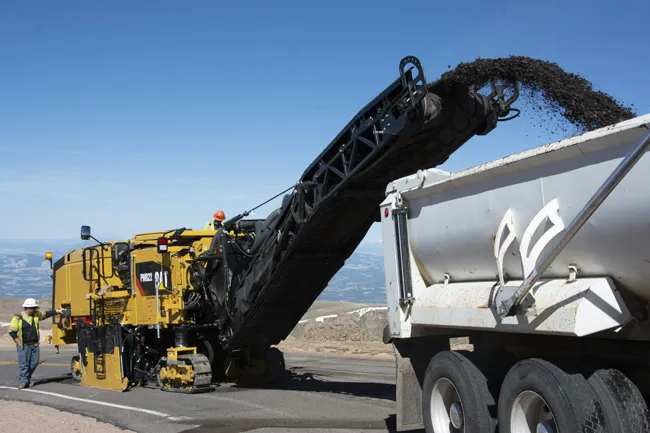Russian construction firm Kamdorstroy has carried out a successful demonstration of recycling techniques to over 60 highway officials, academics and contractors from all over the CIS states. The demonstration was carried out in co-operation with the Russian Federal Highway and Tatarstan Highway authorities and involved milling, recycling and overlaying a road with hot mix asphalt. The work was carried out on a 7.5m wide roadway with 3.8m wide lanes (with an overlap) using machinery and techniques new to Rus
March 7, 2012
Read time: 6 mins

Russian construction firm Kamdorstroy has carried out a successful demonstration of recycling techniques to over 60 highway officials, academics and contractors from all over the CIS states.
The demonstration was carried out in co-operation with the Russian Federal Highway and Tatarstan Highway authorities and involved milling, recycling and overlaying a road with hot mix asphalt. The work was carried out on a 7.5m wide roadway with 3.8m wide lanes (with an overlap) using machinery and techniques new to Russia as well as to the world market.The width of cut required the use of two milling machines. The first cut was done by a
The RX-700 also pushed the emulsion truck and worked at an advance rate of 3-4m/minute, an optimum speed for all the machinery in this process. The RX-700 was used to load trucks and material from these was added to the site stockpile of cold in place recycle mix (CIR mix), with the material then being placed on the roadway immediately following the two milling machines. The base paving operation did not use all the material produced because of the grade difference and some material was added to the stockpile.
Compaction of the cold material was carried out with a combination roller, featuring a steel front drum and pneumatic tyres at the rear. A single drum vibratory roller then followed to achieve compaction, with an additional static roller also used for surface finishing in some sections. The other side of the road had been recycled in the past and its curing was complete, so a tack coat was added and 50mm layer of SMA mix from Kamdorstroy's
According to Roadtec this innovative process cuts costs, improves the road surface and minimises waste by re-using the existing surface in a 100% recycle mode. Estimates of savings suggest cost reductions of $64,000/km for a two lane roadway. The cold recycled layer also acts as a crack relief barrier that protects the SMA and allows a long service life and much lower maintenance costs than other pavement designs. The firm says that this method of cold in place recycling is highly versatile. However, the cold recycle mixing operation is separate from the base paving operation as improving the roadway produces an inconstant stream of material. To provide a long term solution using a cold recycle base, the base has to be laid in a uniform lift and these two operations have to be separated.
Different contractors use different methods and the recycled material can be spread on the roadway with a grader or can be loaded directly into the paver with a conveyor. Some contractors leave the material in a windrow, some load trucks and some simply lift the moldboard and leave it spread on the roadway. Roadtec says that its equipment, which includes the new RT-500 recycling trailer, can be used in an array of configurations for recycling and that customers can choose the machines and methods to best suit the specific application.
Meanwhile Roadtec continues to broaden its recycling range and now offers improved grade and slope control automation for its RX-500, RX-700, and RX-900 cold planers. The SmoothMill package is an automation system designed solely for cold planers. The optional system features integrated connections and cabling, with two dual control boxes for ground personnel, each capable of controlling both sides of the machine. The system also provides the operator with a separate control box that is a master control and Roadtec says that this package makes the milling process easier and more reliable.
The user can plug the controls into sockets located on the outside of the machine, and the system combines right- and left-hand side controls into one box. The system is said to be reliable as the cables are routed through protected areas rather than having them exposed at the outside. Control box and connector locations have been optimised for best performance and ease of use. The two control boxes allow ground personnel to control both sides from either side of the machine, depending upon conditions, without having to move boxes. Thus unit has been developed specifically for the planing cycle, rather than being adapted from a paving control unit and Roadtec believes this will help boost reliability as well as performance as a result.
Meanwhile the Federal Republic of Tatarstan, in the Russian Federation, is facing tough challenges as it is trying to repair and improve its highway infrastructure while facing tight budgetary constraints. This emerging growth market is a prime candidate for using advanced recycling techniques that can avoid the high costs of full road reconstruction. Tatarstan's contractors are finding cold full-depth reclamation a cost-effective way to breathe longevity and durability into existing roadways. Cold full-depth reclamation of roadways offers cost efficiencies of up to 30% when compared to traditional reconstruction methods
Having reclaimed roads with its existing RM350B, the contractor understood the processes required and within 24 hours of the RM500 being delivered the machine was put to work on a sub-base rehabilitation project 150km from Tatarstan's capital city Kazan. The RM500 was commissioned in northwestern Russia and was put to use reclaiming a federal highway, the M-8 connecting Arghangelsk to Moscow near Vologda. According to Tatavtodor the RM500 is highly productive and can achieve around 1.5km/day, carrying out efficient pulverising of old asphalt layers and uniform remixing to provide a strong reclaimed sub-base.
Tatavtodor's paving specialists have aided dealers, providing expertise on the cold full-depth reclamation process in a seminar for customers.
Attendees for the demonstration also surveyed a stretch of roadway reclaimed back in 2002 and this road remains in good condition despite extensive use as a throughway for another major federal highway reconstruction project. During the three-month period following the road being rebuilt, the reclaimed section carried over 3,000 cars and heavy trucks/day without damage.








